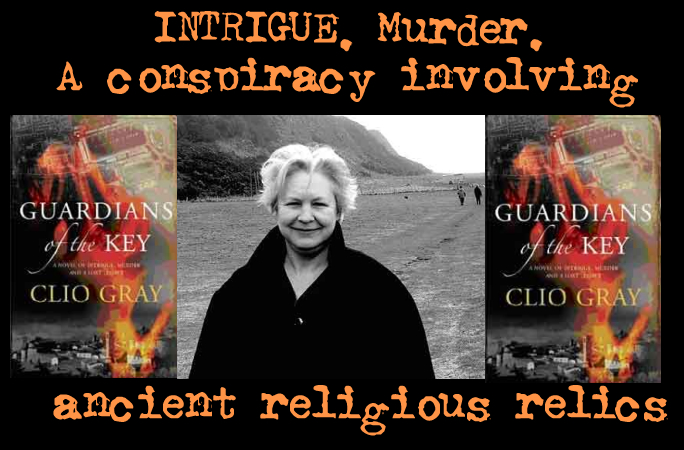
Clio Gray Speaks To Calum MacLeod

Clio Gray Speaks To Calum MacLeod |
|
The ingredients may be similar to a certain mega-selling thriller, but please do not make the mistake one critic made of comparing Clio Gray's debut novel with "The Da Vinci Code". "Oh no," she moans, rolling her eyes long -sufferingly when reminded of the critic's description of her novel "Guardians of the Key" as "just as bloody as 'The Da Vinci Code', but much better written." "It's not like the bloody 'Da Vinci
Code'. The only thing they have in common are that they have these religious
relics," Clio points out. It also dispenses with a contemporary
setting in favour of a recreation of early-19th century England and a plot
set in motion by Napoleon's invasion of Italy. The hunt for the lost relics begins in earnest when Napoleon declares himself King of Italy and hands out principalities to his sisters. Maria Elisa is given Lucca and being a religious woman wants to know where the Volto Santo is. "The bad guys are trying to find it,
the good guys are trying to find it and you have this one girl caught in the
middle," Clio reveals. The innocent girl is Mabel Finchurst, who witnesses the macabre suicide of an Italian exile in a London Church. When her friend, a vagrant boy called Toby is kidnapped, she enlists the help of missing persons finder Whilbert Stroop. The widely read Ms Gray came across Stroop's name and pictured him immediately, and determined to make use of him in her future writing. Anything else of potential interest is filed away in the various files she keeps covering science, literature, nature, expeditions and images. "It's great, because 20 years of
research has finally paid off," Clio adds. "I know from working in the library
that people who read crime books of any kind do like series and characters
and do like to follow them through," Clio says. "It's really hard to get anything
published. Just to get people to read what you have written is really hard,"
Clio says. To get round her antipathy towards large cities, Clio decided to set her story in the past, when London was much smaller and more like a modern day small town. Her own home, in the east Highland village of Ballintore, is certainly far removed from big city life. It is no surprise that Clio decided to
write about murder. She has always had a morbid side to her imagination, she
says, and recalls one of her teachers calling her mother into school because
she was so concerned about something Clio wrote. "The Roaring of the Labyrinth" is due for publication this summer and features a plot which winds from the Black Sea and the creation of the city of Odessa to the Penine Hills as Stroop and his allies are engaged to trace a missing glass maker, recover a stolen perspective box, an early form of 3-D image, and solve the odd murder. Having signed an initial two book deal with Headline, Stroop's future is dependent on how well "Guardians" and its sequel are received. In the meantime, Clio has also been working on a stand alone novel while keeping up the day job at the local library in Tain, where she now finds herself placing her own book on the shelves or stamping it out for her customers. "It's very strange," she admits. "Originally I was going to use a pseudonym, but I decided against it. We have got a few copies, but they are all out at the minute. Because I work in the library, people know me and are curious about the book." Hopefully they will not be the only ones enjoying Clio's work.
|

| Page By Gary Cane [Contact] | ||
| Webmaster: Tony 'Grog' Roberts [Contact] |